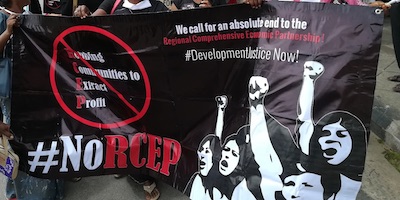
The RCEP trade deal will significantly impact agriculture and possibly deepen the damage to food sovereignty caused by previous trade agreements including those of the WTO.
The RCEP would threaten livelihoods in sectors like dairy, meat and other agricultural products by allowing duty free imports of subsidised products from Japan, New Zealand and Australia. India, with 100 million small scale dairy producers, and Vietnam are among the countries that will be most affected.
A leaked IP chapter proposed for the RCEP pushes for accession by all RCEP member states to the 1991 Act of the International Convention for the Protection of New Varieties of Plants (UPOV 1991). Among the RCEP’s 16 countries, only seven are members of UPOV– the other nine (including Thailand, India, Indonesia and Philippines) would have to change their laws. UPOV 1991 provides monopoly rights to plant breeder rights at the cost of farmers’ rights. It makes it illegal, even criminal, for farmers to save seeds of protected varieties. CSOs have calculated that as a result of UPOV 1991, seed prices would go up by 200-600% in Thailand and by 400% in the Philippines.
Agrochemical sales and use in the Asia and Pacific region would also be boosted as a result of RCEP’s market access rules expanding trade in goods. Data exclusivity provisions in the IP chapter may also extend the patent protection periods of such products, putting upward pressure on food prices.
Another clear threat is land grabbing. If adopted, the leaked investment chapter and services chapter of RCEP may each provide that RCEP members may not discriminate against foreign corporations that want to buy local farmland. In many RCEP countries, this is not possible under current law and could have serious repercussions for agrarian reform in the region.

























